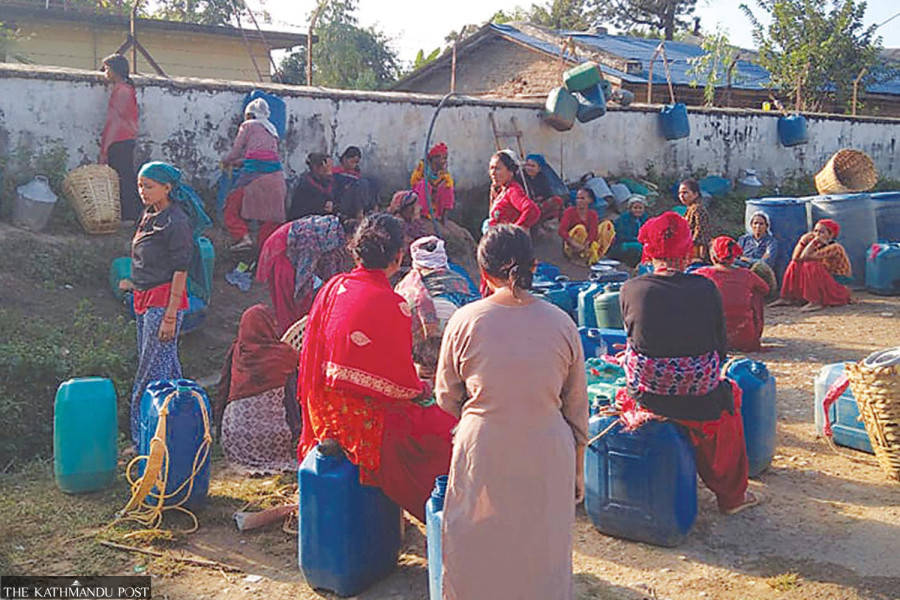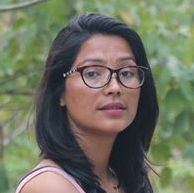Money
Candidates of all stripes promise water supply as always, but never deliver
The people of Surkhet in mid-western Nepal continue to live a hard life for lack of clean drinking water.
Harihar Singh Rathore & Jyotee Katuwal
In almost all the elections held since 1989, the candidates have promised to provide a regular supply of drinking water to the people of Surkhet in mid-western Nepal. But the pledge has never been fulfilled in all these years.
A succession of politicians have come and gone, and the people of Surkhet continue to live a hard life for lack of clean drinking water. As per the provincial government's statistics, nearly 15,000 households in Surkhet lack access to piped water.
Residents in the provincial capital Birendranagar keep expecting drinking water schemes to be implemented, and get their hopes up during every election season.
This year too, drinking water is the key election plank for the political parties vying in the November 20 general election.
Some candidates have promised voters that they will provide free drinking water while others have pledged to install water taps in each and every home.
“They are all fake promises,” said local resident Kamal KC. "This year too all the parties have pledged to provide clean drinking water. But we do not know when the leaders will fulfil their promises.”
Birendra Sapkota, 56, of Birendranagar-6, says he has been hearing the promise for the last three decades.
“Drinking water is a decades-old problem in the area. Now, due to spreading urbanisation, it has worsened. We don’t care who wins. We are only concerned about drinking water."
The Supra Extensive Water Supply and Sanitation Users Organisation, a project which was established in 2000, is currently distributing drinking water in Birendranagar.
Mohana BK, 30, from Birendranagar-4, Mitranagar, says the candidates who come to her home before every election make the same old promises. "We don’t believe in leaders. All leaders are liars," BK said.
During the local election in May too, the leaders had asked for votes by giving the same assurances. "They had promised to launch a One Home, One Water Tap scheme, and also provide land ownership certificates," she said. “The leaders are giving the same old guarantees this time too.”
Surkhet Valley has a population of around 300,000, and the water user organisation has been supplying clean drinking water to nearly 25,000 households.
Hridayram Thane, a candidate for the House of Representatives from Surkhet-2, said he would resolve the water supply problem in Surkhet Valley durig his five-year term if he is elected.
"The drinking water problem is one of the biggest problems in Surkhet. It has been mired in politics for a long time," Thani said. “Clean drinking water is also a fundamental right of the people, and the Nepali Congress Party is committed to ensuring this right.”
Nepali Congress leader Kali Prasad Shakya and the UML's Yam Lal Kadel are also contesting a seat in the House of Representatives. They have been going door to door telling voters that they will end the problem of drinking water.
In Jajarkot, the same old faces are contesting the elections, and they have the same old election agenda—providing clean drinking water.
A shortage of drinking water has been making people’s lives difficult mainly in Khalanga, the district headquarters.
In 1923, Rana prime minister Chandra Shamsher's youngest wife had ordered Budbudi forest to be protected as a source of water and installed 11 drinking water taps in Khalanga. But as the forest area started shrinking, the water supply dried up and locals of Khalanga have been facing problems.
"It has been a decade and a half since there has been no water," said Khama Jung Shah, former ward chairman of Bheri Municipality-4.
Basanta Prasad Sharma, ward chairman of Bheri Municipality-4, said the proposal to conserve the Budbudi area and provide drinking water to the people has been ignored by the federal government.
Irrigation facilities have also reached Chaurjahari of Rukum West from Kudu. But the locals of Kudu have been facing drinking water problems for years.
"Due to lack of irrigation, only one crop cycle is possible here," said Amar Budha, a local. Nearly 1,000 houses have had no drinking water for years.
Ganesh Batala, a local youth, says some households are getting drinking water from the lift irrigation project built last year by Bheri Municipality at a cost of Rs500,000.
He said that they had been suffering from water shortages for years due to lack of a suitable plan. "The Bheri River flows below the village but the villagers are suffering from lack of drinking water. We have not been able to get clean water for generations although a big water resource exists just below the village.”
The Chhahari-Kudu Drinking Water Project was started two years ago in order to resolve the drinking water problem. But the scheme—in which Bheri Municipality has spent Rs4.2 million, the Extensive Watershed Office Rs200,000 and the Water Supply, Irrigation and Energy Development Office Rs400,000—is still incomplete.
"Even if a budget is allocated and funds spent on the plan, it is like pouring water on the sand if there is no monitoring," said local resident Ram Krishna Giri. "The budget does not come easily, and even if it comes, the work is of poor quality.
Though budget funds are allocated annually to implement drinking water schemes, the problem never ends for locals.
Jwalaraj Shahi, chief of the Water Supply, Irrigation and Energy Development Office, said running an extensive water supply project in Kudu is difficult because of the small budget allocation.
"We receive a budget for repairs and constructing small projects. Though we have informed the federal government about the problem, they are ignoring it,” he said.




 8.79°C Kathmandu
8.79°C Kathmandu-(2).jpg)















